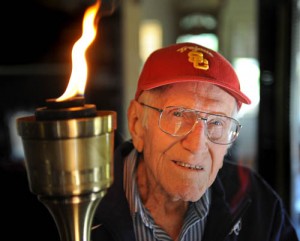Better for air travel.
“If I knew I had to go through those experiences again, I’d kill myself.” – Louis Zamperini
If you think you’ve been rocked to your core by a memoir before, think again. Ingrid Betancourt’s story of her captivity in the Colombian jungle; In Harm’s Way  – which until Unbroken I considered the most harrowing shark on man story ever told; Phillip Gourevitch stories from Rwanda, all blur under the crystalline focus of this saga of an Army bombardier in World War II. It’s like something out of Greek mythology. Laura Hillenbrand  – who wrote the stellar “Seabiscuit” which was made into the horrendous movie “Seabiscuit” – uses the same inspirational, crystalline writing that she used to tell the “horses tale”, that renders complicated, technical equine or wartime topics not just readable, but hard-to-put-downable.
Louis Zamperini grew up a juvenile delinquent in Torrance, California (you know, the crummy LA suburb whose High School is the setting for West Beverly High?), and thanks to a breaking and entering habit that had him fleeing from police, and under the grueling tutelage of his older brother, he developed into a world-class runner within sight of the four-minute mile. He ran for his country in the 1936 Olympics – in a Berlin bristling with Nazism – innocent to the world being on the brink of war. When enlisting 4 years later, he was sent to Hawaii as a B-24 bombardier, and the Olympian became an airman, in vicious air battles with psychotic pilots of Mitsubishi A6M Zeros. From May of 1943, when his B-24 went down over the Pacific, his life became an odyssey of  thousands of miles of open black ocean, thirst and starvation that drove him to kill seabirds with his bare hands and drink their blood as an enemy airplane strafed the disintegrating raft and leaping sharks circled it. He was saved from the sharks by the enemy, and entered Japan’s “theater of cruelty”, as a POW in one of the country’s most brutal camps. The story encompasses an aspect of the American experience during World War II — the almost unfathomable cruelty of the Japanese —  that, in an era of the Prius, Hello Kitty and Hideki Matsui, seems almost unbelievable.
His fate, whether tragedy or salvation, would be suspended on the fraying wire of his will. Driven to what have to be the limits of human endurance, Louis Zamperini answers desperation with contrivance and the irrepressible American-style irreverence that is shared by “America’s Greatest Generation”. This story is a testament to the courage and ingenuity of that Generation, while other military tallies, in Afghanistan and Iraq, less wrenching but poignant nonetheless, quietly proceed. Every day more than 700 veterans of the Second World War die, and with each one goes a story, which is why Veterans Day drives me to distraction every year. My dad, drafted out of abject poverty (a chicken farm in Elmer NJ by way of an orphanage in the Bronx), narrowly avoided getting wiped out with the rest of his unit in the Battle of the Bulge. Laura Hillenbrand reached Louis Zamperini when he was in his mid-eighties  – he is 93 now. I wonder how many other stories there are like his. Probably something like 700 a day.
Unbroken by Laura Hillenbrand
Buy it, check it out, order it (from a real bookstore) or download it.



